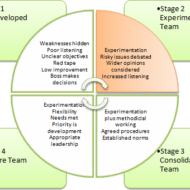Posted by Managementguru in Business Management, Human Resource, Organisational behaviour, Training & Development
on Mar 30th, 2014 | 0 comments

Ideal Team Development How to effect ideal team development? As the saying goes, there is no ‘I’ in TEAM WORK. Every organization should understand the importance and highlight the need for TEAM DEVELOPMENT amongst their employees. In a small group there are chances for the ‘WE’ feeling to predominate for obvious reasons. In case of larger groups as seen in big corporate, individual interaction becomes complex and gives rise to conflicts which hold back the progress. The “I” Factor: Even philosophers don’t support or advocate the “I” FACTOR in individuals. It is purely a result of SUPER EGO as Sigmund Freud has put it rightly. Man is a MYRIAD OF EMOTIONS and his mind always picks up wrong cues and signals perfectly. So, TRAINING plays a major part in tuning the individual’s mind or shall I say, SYNCHRONISING his understanding with that of the organisation’s. Try to clearly explain during the induction as to: What is the ultimate goal of your organization in terms of productivity? What is expected of each individual in his own capacity? What is the culture of the organization? What is the leader of the organization like? How do you interact with your team mates? Code of conduct and disciplinary procedures What is his role regarding the team’s development? Picture Courtesy: Popyourcareer.com Self Awareness: Self awareness is the key factor for the growth of any individual.A mind that is PHILOSOPHICALLY BENT would prove prosperity to the team as well as the organization. Western countries have realized the importance of keeping the mind cool which can be well achieved through MEDITATION AND YOGA. Sensitivity training is of paramount importance to any organization as an intervention for achieving the overall goals of the organization. Inter Personal Human Behavior: Effective human interactions are the backbone of efficient organizations and this is not possible unless the interpersonal human behavior is CONTROLLABLE AND OPEN TO DISCUSSION. There should always be SCOPE for improvement and SPACE to express one’s feelings and offer ideas, i.e., sense of participation must be groomed. Team leaders and Managers are to be suitably trained to steer their ship and also rewards are welcome to motivate the crew. Why don’t leaders experiment with new behavior of effective leadership casting away conservative methods and also design flexible norms? It will constitute for a well behaved group and paves way for your organization to be UNIQUE. While organizing a group, a manager should carry out the process with a humane perspective taking into account, the human values, vision, creative thinking and better means of motivation. These factors align and bind the organization together paving way for holistic thinking and collaborative...

Posted by Managementguru in Business Management, Human Resource, Interview Questions, Principles of Management, Training & Development
on Mar 22nd, 2014 | 0 comments

The Purpose of a Job Interview Interviewing cannot be viewed just as a two way conversation, but as a process of social interaction. Personal interview is the most flexible tool that helps to obtain the most accurate information about the prospective candidate as the presence of the interviewer makes it hard for the respondent to report incorrectly. You might have seen some poker players with a winning spree. That is because of their ability to guess opponent’s potential apart from their own knowledge about the game. The same applies to an effective interviewer who elicits the most appropriate information from the interviewee by gauging his potential and scope. Ambience: The ambience of an interview should facilitate the respondents to freely come out with their ideas about what they expect from the job and also what they are capable of contributing in terms of lifting the organization to greater heights. Fear generally grips freshers who may not have had exposure to such situations that decides their future. Even before completing their engineering or professional courses students get placed in very good companies that offer much scope in terms of pay and career advancement. It has become statutory for these students to express themselves in the most impressive manner to capture the interest of the interviewers and to outsmart their rivals competing for the same position or capacity. Body Language: Your body language speaks volumes about the self confidence you possess, whether you are really capable of leading. Pleasing personality is definitely a plus and it is a winning strategy to get noticed among the pool of prospects. Try to be as modest and dignified in your behavior and attitude but at the same time be self assured to avoid any question that falls beyond the scope of discussion or if it is aimed to puncture your ego. Stress Interviews: Most of the stress interviews are structured in order to test the tolerance level of the prospective employees given a crisis situation and also to judge their decision making skills in such a situation. Rapid fire questions are thrown before you, wherein either you can buy some time to think, keep quiet to prove your self control or burst open and check out. Higher level management interviews are of this order as managers of the senior levels and CEO’s are constantly exposed to pressure situations and they need to keep their think tank cool to keep going. Systematic interviewing using lucid language is welcome. The session must be to the point and the respondent should not lose interest in the interview. Emotional and leading questions better be avoided. The interviewer must be a trained man who has the ability to conduct the interview in the most natural way and also should be well informed about all the possible and important aspects about the prospective candidates. Hypothetical Questions: Recent trend is to ask hypothetical questions where the respondent has to place himself in a particular situation and arrive at solutions. This probes beyond the skill sets that the respondent possesses and it concentrates on the crisis management ability, presence of mind and the quick wit of individuals. Corporate companies conduct their interviews in a completely different manner. They are more concerned about the attitude, morale, soft skills, role analysis and the like. How an individual performs as a member of a team or a group and how well he can lead his team in times of crisis are a matter of concern in big corporates. Say for instance, if you are the head of a company, what possible changes would you bring in terms of sales, marketing and production? What will be...




